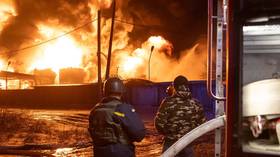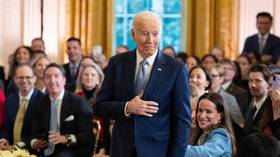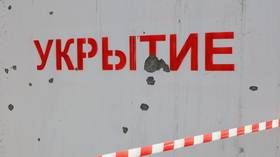Tuesday's Russian press review

This Tuesday Russian newspapers report on the Evian Conference, analyse the choices of Belarus, look into the U.S. election, speculate about a war in Iran and attempt to see another war from the point of view of subjunctive mood. Here is the review of sev
VREMYA NOVOSTEI calls the Evian forum ‘A Conference on the Foreclosure of the One-Polar World.’ It quotes experts as saying that the world financial crisis will be the core issue on the agenda, together with bad governance and unequal distribution of natural resources. The paper says the conference is going to concentrate on current challenges the world has to face and respond to. Another matter for discussion, says the article, will most probably be the results of the implementation of the Medvedev-Sarkozy agreements on South Ossetia and Georgia. The paper says a discussion of this matter will inevitably become an exchange of opinions on the role of Russia in the modern world. The conference, says the paper, is also bound to accept the de-facto failure of the ‘one-polar World’ with the U.S. as a sole superpower trying to control everything, and the birth of a new reality where Russia and the EU each have a paramount role to play.
MOSKOVSKI KOMSOMOLETS has an exclusive interview with Igor Smirnov, the president of the unrecognised Transdniester Republic, who says he is not completely happy with the plan of resolving his republic’s problems with Moldova, suggested by Moscow. The president is quoted as saying that he is ready to negotiate a non-aggression pact with Moldova and a cooperation agreement, both to be guaranteed by Russia and Ukraine. However he is flat against any discussions of the Transdniester region as a part of Moldova. Smirnov, says the paper, is not happy about the fact that Russia has recognised South Ossetia and Abkhazia but not his republic. He says that uniting Moldova and the Transdniester region is like ‘cross-breeding a hedgehog and a snake’. A Russian saying implies that such a union can only produce a metre’s length of barbed wire.
MOSKOVSKAYA PRAVDA writes that the parliamentary election in Belarus hasn’t changed anything for president Lukashenko: he still faces a choice between the West and Moscow as before. The paper says fears of his participation in Russia’s ‘asymmetrical response’ to the elements of the U.S. missile defence being deployed in Eastern Europe had prompted Washington to lift some of the sanctions against Belarus even before the election. Now, with the election in the past, although unrecognised by international monitoring bodies, more sanctions are going to be lifted anyway. The paper says there is no danger of a ‘colour revolution’ in Belarus, so Lukashenko has no reasons to change anything in his friendly relations with Moscow.
KOMMERSANT looks into the U.S. election through the eyes of columnist Nikolai Zlobin, a Russian-American academic from Washington who calls the current election campaign ‘a unique blend of drama and soap opera.’ He writes that the outcome of the campaign is far from clear: it now depends not as much on the actual merit of the candidates as on their ability to ‘publicly hit the opponent in the solar plexus.’ He says at the final stages of the campaign one accurate shot of mud in the face of their adversary could overcome months of positive ratings.
TRUD tries to calculate the chances of the U.S. or Israel striking on Iran in the near future. The paper comes to the conclusion that neither America, with two not very successful wars on its hands already, nor Israel, which understands best of all how quick and devastating the retaliation could be, are ready to unleash a new armed conflict. The paper suggests that both these countries are going to redouble their efforts in an attempt to persuade Russia to stop exporting arms to Iran and supporting its atomic industry.
IZVESTIA writes that history doesn’t have a subjunctive mood and what has happened cannot be undone. However the paper decides to look into the ‘five day war’ in South Ossetia with a few ‘ifs’ and ‘maybes’. It suggests two options: one – if Moscow had decided against a counterstrike on the Georgian forces. In that case the paper says the war would have been longer and more people would have died on both sides. Two – if the counterstrike included a march on Tbilisi. In that case Russia would have to retreat later anyway and the treacherous policy of Mikhail Saakashvili would not have been exposed. The paper concludes that what happened in reality was indeed the best option chosen for Russia’s national interest by its leadership.
Evgeny Belenkiy, RT.











